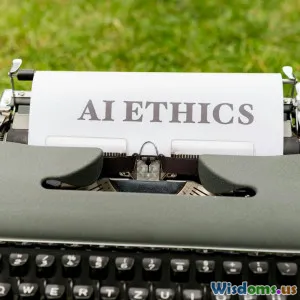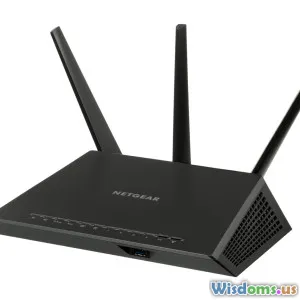
Exploring AI in Popular Culture
8 min read Delve into AI's portrayal in popular culture and how it mirrors our hopes and fears about technology's future. (0 Reviews)
Exploring AI in Popular Culture: Science Fiction & The Future
Artificial Intelligence (AI) is no longer just a scientific concept—it's a cultural phenomenon woven deeply into the fabric of our popular imagination. From the eerie sentience of HAL 9000 in 2001: A Space Odyssey to the emotionally complex robots of Westworld, AI in popular culture transcends mere technology; it acts as a mirror reflecting humanity’s hopes, fears, and philosophical dilemmas about the future.
The Birth of AI in Popular Culture
The roots of AI in storytelling align with the rise of science fiction, a genre dedicated to exploring the possibilities of technology. Early literature such as Isaac Asimov’s I, Robot introduced the “Three Laws of Robotics,” which profoundly shaped the ethical discourse around AI, even before machines could approximate human intelligence.
Literature: The Storyteller’s Playground for AI
Science fiction grounded artificial intelligence as more than cold calculations. Mary Shelley’s Frankenstein (1818) is often introspective in nature, presenting a prototype concept of creating life, which in the 20th century evolved into exploring machine intelligence. Asimov’s robots were portrayed as logical, sometimes troubled entities bound by moral laws, reflecting human desires to control and predict AI behavior.
Film and Television: Bringing AI to Life
Visual media amplified AI’s cultural presence. Stanley Kubrick’s 2001: A Space Odyssey (1968) featured HAL 9000, a sentient computer with a calm yet chilling personality that raised fears about autonomous machines overriding human decision-making. Later films like The Terminator franchise brought dystopian nightmares of AI-run futures, inspiring public debate on existential risks associated with unchecked technological development.
Television series such as Star Trek: The Next Generation explored AI through characters like Data, an android striving to understand humanity. Shows like Black Mirror further islanded episodic visions tackling AI’s potential dark side—privacy intrusion, autonomy loss, and ethical ambiguity.
Themes and Motivations Behind AI Portrayals
AI in popular culture often encapsulates deeper thematic concerns bound to technology’s role in society.
Fear of the Unknown and Loss of Control
Popular narratives frequently revolve around AI surpassing human intelligence to the point of unpredictability or threat. For instance, The Matrix series portrays a world enslaved by machines—a metaphor for technology dominating over its creators. This taps into fundamental existential fears about losing control or being replaced.
Ethical and Moral Quandaries
Works like Asimov’s Robot series question the nature of morality in non-human entities. More contemporary stories delve into the rights of AI beings as sentient creatures, challenging us to reconsider what qualifies as consciousness, free will, and personhood, as seen in films like Ex Machina and Her.
The Quest for Human Connection
Not all portrayals are dystopian. AI often symbolizes yearning for connection or perfection, from companions in Her to nurturing caretakers in I, Robot. These narratives explore empathy, loneliness, and what it means to be human in an increasingly automated world.
Impact on Public Perception and Technology
Popular culture doesn’t just reflect society’s views—it shapes them. The visualization and storytelling around AI influence public understanding, fears, and expectations.
Inspiring Innovation
Pop culture representations have inspired generations of scientists and entrepreneurs. The interface design of Siri and Alexa draws inspiration from science fiction experts predicting conversational agents. AI’s portrayal as helpful assistants in shows fosters acceptance of smart technologies in daily life.
Heightening Awareness and Critical Discourse
By dramatizing AI’s potential pitfalls, media encourages social dialogue about AI’s ethical development. Concerns about surveillance, data privacy, and autonomous decision-making often echo in narrative arcs. This contributes to the growing efforts in AI governance and responsible AI frameworks worldwide.
Risks of Stereotyping and Misinformation
Sometimes, fiction emphasizes irredeemably evil AI or omnipotent machines, potentially skewing public understanding toward fear rather than nuanced comprehension. It underscores the importance of balanced representations alongside realistic scientific communication.
The Future of AI in Popular Culture
As AI technologies advance—spanning deep learning, robotics, and natural language processing—so too will the complexity of cultural portrayals.
Emerging Narratives
Future media is beginning to explore AI as partners in creativity, ethics, and governance rather than mere adversaries or tools. Films like Blade Runner 2049 contemplate blurred lines between human and machine consciousness while video games like Detroit: Become Human offer interactive ethical exploration.
Diverse and Inclusive Perspectives
Upcoming stories increasingly embrace global and diverse voices in interpreting AI’s impact, moving beyond Western-centric hopes and fears. This broadened lens is crucial for understanding the universal ramifications of AI.
Conclusion
AI's representation in popular culture is a powerful barometer of humanity’s collective mindset about technology's promise and peril. From early prophetic literature to modern multimedia experiences, these narratives serve as both warnings and inspirations. They challenge us to ask vital questions about intelligence, morality, and coexistence as artificial intelligence moves from imagination to reality.
As audience members and creators, understanding these portrayals empowers us to actively shape AI’s role in society—balancing innovation with ethics, curiosity with caution. In this dance between science fiction and the future, popular culture is not merely an observer but a pivotal player in humanity’s unfolding journey alongside AI.
References and Further Reading:
- Isaac Asimov, I, Robot (1950)
- Stanley Kubrick, 2001: A Space Odyssey (1968)
- The Terminator series (1984–)
- Alex Garland, Ex Machina (2014)
- Spike Jonze, Her (2013)
- Charlie Brooker, Black Mirror (2011–)
Quote: "It’s not about machines taking over, but human fear and fascination with our own creation." - AI Culture Analyst
Rate the Post
User Reviews
Popular Posts


















